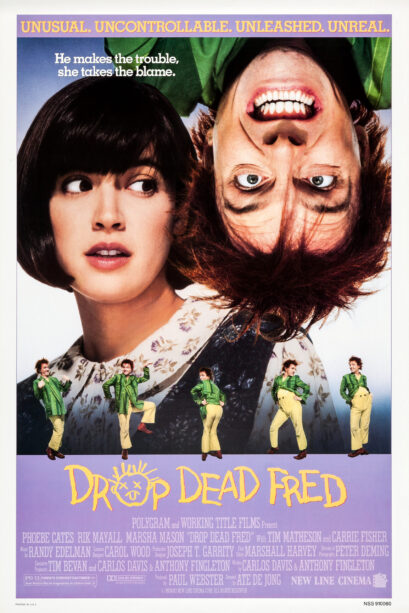 A rare film that’s improved with age. In its day DROP DEAD FRED (1991) was dismissed, correctly, as a cut-rate BEETLEJUICE wannabe. It still is, but the film is interesting as a nineties chick flick crossed with HARVEY (1950) and an undertone of genuine psychological unrest. I just wish DROP DEAD FRED had gone a little farther than its PG-13 rated perimeters allowed.
A rare film that’s improved with age. In its day DROP DEAD FRED (1991) was dismissed, correctly, as a cut-rate BEETLEJUICE wannabe. It still is, but the film is interesting as a nineties chick flick crossed with HARVEY (1950) and an undertone of genuine psychological unrest. I just wish DROP DEAD FRED had gone a little farther than its PG-13 rated perimeters allowed.
Elizabeth (Phoebe Cates) is a mousey young woman traumatized by her domineering mother Polly (Marsha Mason) and an imaginary friend called Drop Dead Fred (the late British comedian Rik Mayall, whose only American film role this was), a Beetlejuice-like slob. Elizabeth’s present life is pretty hopeless, with her car stolen, her job as a court reporter terminated and her husband Charles (Tim Matheson) walking out on her, which revives the long-dormant Fred, who, it seems, is fated to help Elizabeth get back together with Charles.
Flashbacks fill us in on Fred’s earlier exploits, which included vandalism and destruction that made Polly and most everyone else in her life believe Elizabeth’s younger self (Ashley Peldon) was crazy. Fred again wreaks all sorts of havoc in the here-and-now, including food throwing, the sinking of a houseboat belonging to Elizabeth’s friend Janie (Carrie Fisher) and an attack on a violinist. Polly takes her daughter to a psychologist, during which Fred meets up with imaginary fellows like Go to Hell Herman (Peter Breitmayer), Velcro Head (Clark Niederjohn) and Namby Pamby (Elizabeth Gray), but his existence is threatened by pills prescribed to Elizabeth. His objective, however, appears to be realized when Charles decides he wants to reconnect with his wife and she agrees, ignoring the fact that he’s blithely screwing around with the sexy Annabella (Bridget Fonda).
According to DROP DEAD FRED’s Rotten Tomatoes page, it tackles “mature themes with an infantile sensibility.” That spirit is portended by the opening scene, in which the young Elizabeth dismisses a fairy story told by her mother as “a pile of shit,” but it isn’t followed through. Instead, we get a tame and unadventurous film that isn’t nearly as gross or infantile as so many critics claimed, although its psychological underpinnings are authentically twisted.
Director Ate de Jong (whose 1981 Dutch film A FLIGHT OF RAINBIRDS/Een vlucht regenwulpen had much in common with this one) has dubbed himself “one of hundreds of gold-diggers in Hollywood, and my God, I struck gold” by getting offered DROP DEAD FRED. He claims to have redrafted the script to reflect his own childhood abuse, which was apparently “not something ever spoken about on the set, not with Rik or anyone, but for me it existed.” Not incidentally, de Jong cast his own mother as a woman who gets splashed with yellow paint, a scene that was apparently “cheaper than 10 therapy sessions.”
Many of the criticisms lobbed at the film during its initial release remain valid. The narrative is shrill, scattershot and unconvincing, with characters who tend to be remarkably nonchalant about vandalized houses, stolen cars and sunken houseboats, and the SECRETS OF A SOUL-esque last act surrealism is quite shallow. The visuals crafted by de Jong and cinematographer Peter Deming are shockingly pedestrian, and the special effects notably unimaginative (with shrinking and popping eyeballs being the seeming extent of Drop Dead Fred’s powers).
Another problem is the casting of Phoebe Cates as Elizabeth. While appropriately childlike, she’s too beautiful to be convincing as a needy loser, and looks nothing like Marsha Mason, who’s supposed to be her mother.
Vital Statistics
DROP DEAD FRED
Polygram/Working Title/New Line Cinema
Director: Ate De Jong
Producer: Paul Webster
Screenplay: Carlos Davis, Anthony Fingleton
Cinematography: Peter Deming
Editing: Marshall Harvey
Cast: Phoeve Cate, Rik Mayall, Marsha Mason, Ron Eldard, Tim Matheson, Carrie Fisher, Daniel Gerroll, Keith Charles, Cheryl Hawker, Peter Breitmayer, Clark Niederjohn, Tom Bethke, Elizabeth Gray, Bridget Fonda, Eleanor Mondale, Bob Reid, Peter Thoemke
